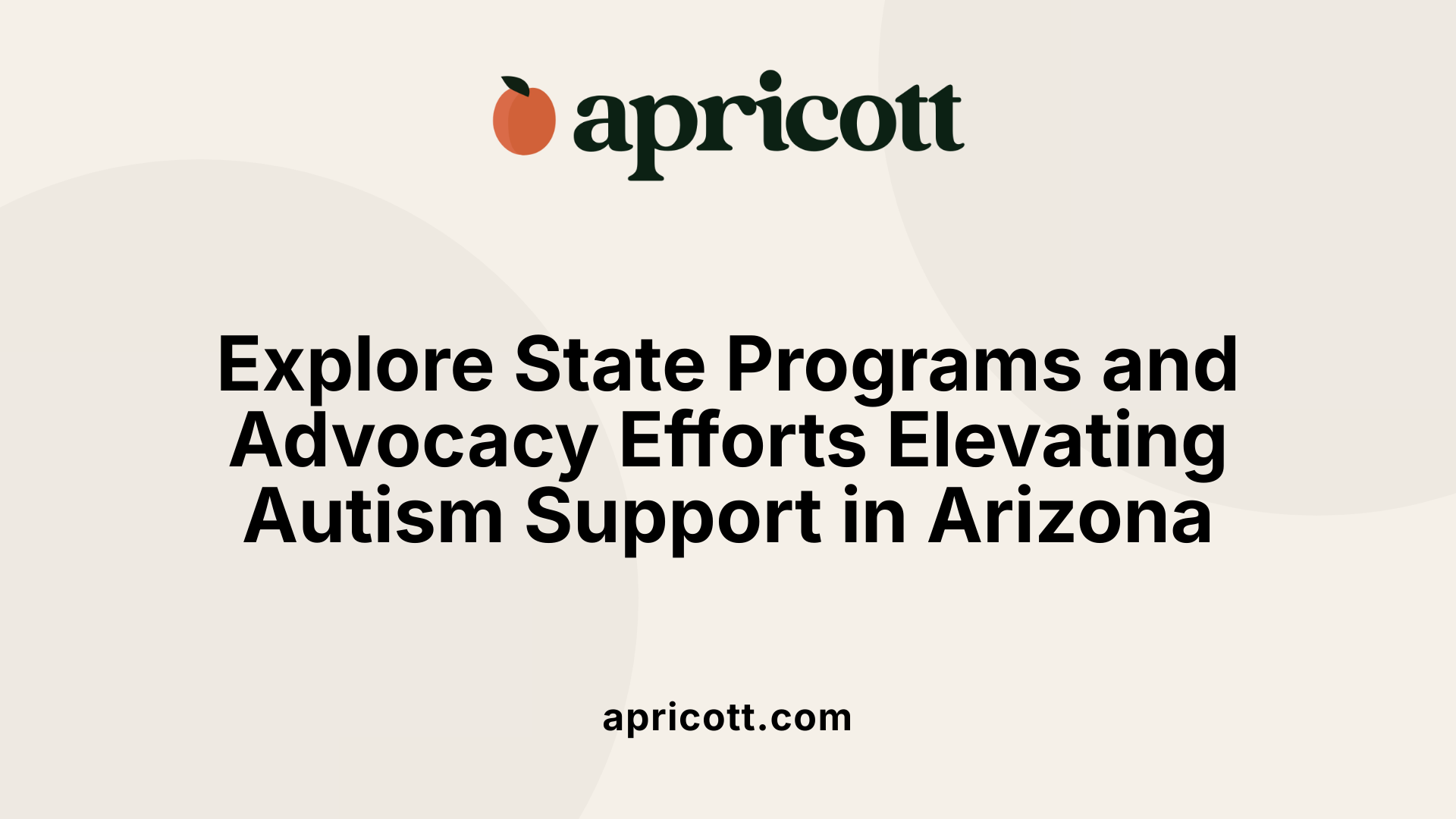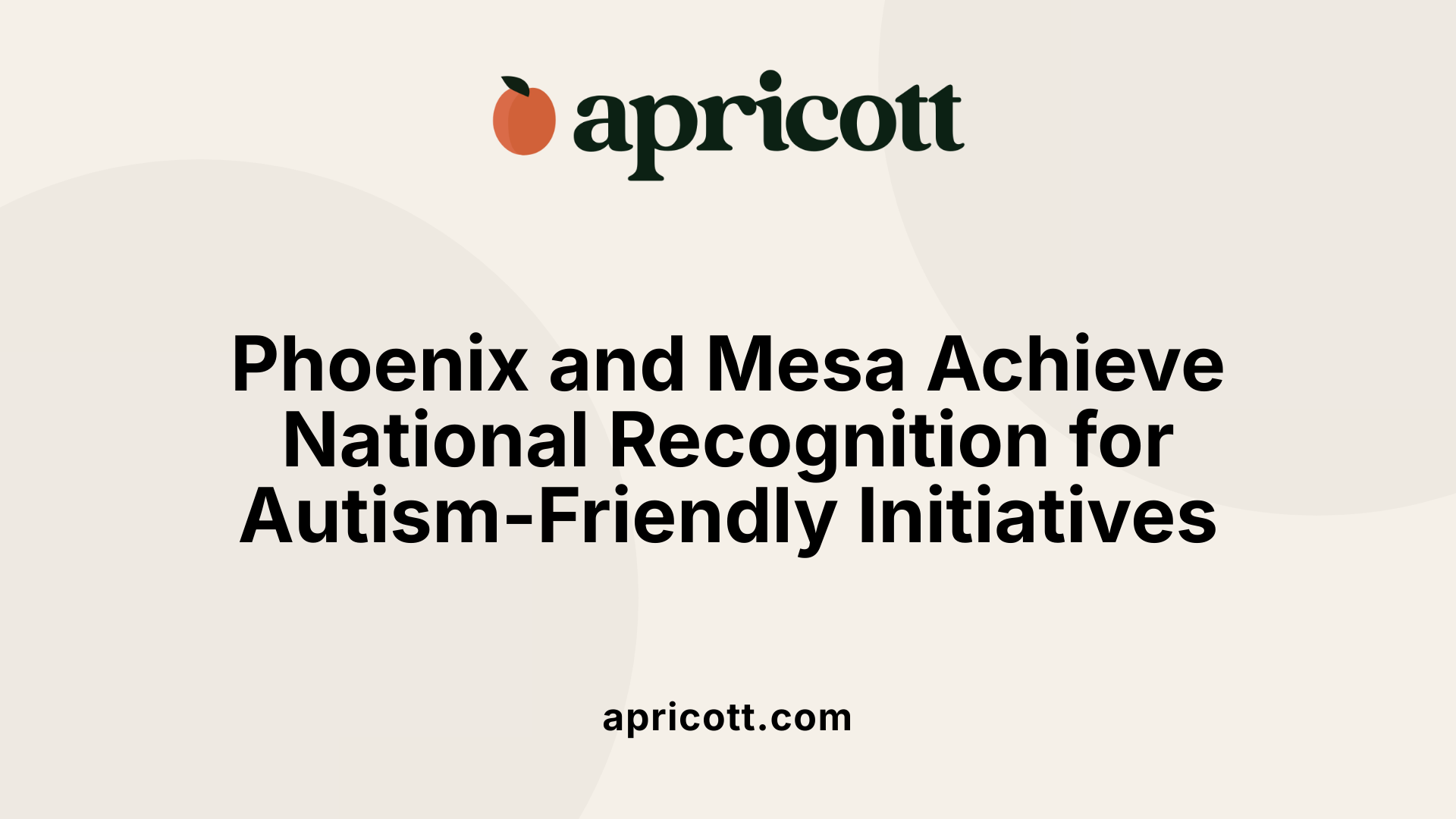July 28, 2025
Arizona’s Commitment to Autism Support and Inclusion
Arizona has long been recognized for its progressive approach to supporting individuals with autism. From groundbreaking city certifications to comprehensive state programs, the state demonstrates a strong commitment to fostering inclusive communities. This article explores the breadth of autism services, community involvement, and the supportive infrastructure that makes Arizona a notably favorable environment for individuals with autism and their families.
Arizona offers a broad spectrum of programs and services tailored to meet the needs of individuals with autism and their families. These include early childhood screening and intervention programs designed to identify autism spectrum disorder (ASD) early, which is crucial for effective treatment.
For very young children, the AzEIP program provides specialized services for infants and toddlers with disabilities, including autism, from birth up to age 2. Early intervention is vital in helping young children develop critical skills and access educational support early on.
Behavioral therapies are a cornerstone of autism treatment in Arizona. Applied Behavior Analysis (ABA) is widely available and often covered by Medicaid, which supports children and adults alike. Occupational, speech, physical, and vision therapies are also accessible through various public and private providers. These therapies help improve communication, motor skills, and daily functioning.
Educational supports are integral for students with autism. Arizona mandates special education evaluations within 60 days of a request, ensuring timely access to Individualized Education Programs (IEPs). Schools collaborate with families to develop tailored educational plans to meet each child's unique needs.
Healthcare coverage in Arizona, especially through Medicaid and programs like the Arizona Long Term Care System (ALTCS), provides financial support for necessary therapies and services. The ALTCS program involves a multi-step application process to qualify, but once enrolled, individuals receive comprehensive support coordination.
Beyond direct services, Arizona hosts support organizations like the Autism Society of Greater Phoenix, which offers resources, training, and social support to families. They organize community events, awareness campaigns, and provide Spanish-language resources.
Overall, state and community resources combine to make Arizona a leading place for autism support, from early diagnosis through adulthood. The collaborative efforts between government agencies, nonprofit organizations, and local communities ensure accessible and holistic services.
| Service Area | Available Programs | Additional Details |
|---|---|---|
| Early Childhood Screening | AzEIP, local pediatric services | Focus on infants and toddlers to promote early intervention |
| Behavioral Therapies | ABA, occupational, speech, physical, vision therapies | Covered by Medicaid and private insurance |
| Educational Support | Special education evaluations, IEPs | Legally required evaluations within 60 days |
| Healthcare Coverage (Medicaid, ALTCS) | Medicaid behavior interventions, ALTCS support | Multi-step application process, supports comprehensive care |
| Support Organizations | Autism Society of Greater Phoenix, support groups | Offer training, resources, community engagement |
Arizona continues to build on its reputation as a leading state for autism services, ensuring individuals can access the care and support they need at every stage of life.

Arizona offers a robust support system for individuals with autism through a combination of state programs, federal benefits, and strong advocacy organizations. One prominent state initiative is the Division of Developmental Disabilities (DDD), which provides support coordination and access to services—though eligibility hinges on meeting specific criteria beyond an autism diagnosis alone.
For early intervention, the state runs AzEIP, targeting infants and toddlers from birth to age two, offering critical therapies and evaluations. Additionally, the Arizona Long Term Care System (ALTCS) aids eligible residents with funding for ongoing care, requiring a multi-step application process. Both programs support the goal of inclusive, tailored care for those with autism.
Arizona's commitment extends through legislative reforms, most notably the autism insurance reform enacted in 2008, which was fully implemented by 2019. This change mandated insurance coverage for autism therapies like Applied Behavior Analysis (ABA), occupational, speech, and physical therapy. Medicaid further complements these benefits by covering behavior intervention services for children, serving as a national model.
Educational support remains vital, with local school districts legally required to evaluate children for special education within 60 days. Families are encouraged to access free classes such as Autism 101, designed to educate parents and caregivers about available services, the educational process, and navigating systems. Support groups, both online and in-person, connected to organizations like the Autism Society of Greater Phoenix, provide community and advocacy avenues.
Advocacy groups play a crucial role in raising awareness and influencing policy in Arizona. The Autism Society of Greater Phoenix, established in 1973, is notably recognized for its community outreach and educational campaigns, including their nationally acclaimed 'I Am' Campaign that seeks to break stereotypes associated with autism.
This organization offers a range of resources, social events, training sessions, support groups, and advocacy services. They also provide Spanish-language resources to serve the diverse population of Arizona. Their efforts extend to community involvement through events, fundraising, and public awareness initiatives aimed at fostering inclusion and understanding.
Autism Speaks, although based nationally, also supports advocacy efforts that influence policy reform and promote autism awareness across states including Arizona. Their campaigns focus on improving healthcare access, funding for research, and community support programs.
Arizona's legislative landscape has significantly advanced autism support through reforms that ensure insurance coverage and protect against discrimination. The mandatory coverage for autism therapy has been a landmark achievement, alongside Medicaid expansion for autism-related services.
Funding support from both state and federal sources, such as Medicaid and the state's vocational rehabilitation programs, helps individuals with autism attain employment and independence. The Department of Economic Security (DES) administers vocational programs that assist with job training, job placement, and workplace accommodations—leading to many success stories of gainful employment.
Overall, Arizona’s comprehensive set of programs, advocacy efforts, and legislative reforms create an inclusive environment that champions the well-being, education, and employment of individuals with autism. Together, these initiatives aim to foster a community where autism is understood, accepted, and supported.
| Program/Benefit | Description | Additional Notes |
|---|---|---|
| AzEIP | Early intervention for infants and toddlers | Provides therapies & evaluations from birth to age 2 |
| DDD | Support coordination & services | Requires meeting specific eligibility criteria |
| ALTCS | Long-term care funding | Multi-step application process |
| Autism 101 | Parental education classes | Free, covers access & processes |
| ABA & Therapy | Applied Behavior Analysis & therapies | Covered by insurance & Medicaid |
| Vocational Rehab | Employment assistance | Job training & workplace support |
| Support Groups | Community & online resources | For families, adults, and caregivers |
This interconnected network of programs, benefits, and advocacy efforts underscores Arizona's dedication to supporting its autism community, ensuring access, inclusion, and empowerment for all.

Arizona offers a robust network of community support systems and organizations dedicated to helping individuals with autism and their families. One of the most prominent is the Autism Society of Greater Phoenix, established in 1973, making it the oldest autism organization in the state. This organization has gained national recognition, including the 2024 Affiliate of the Year award from the Autism Society of America.
The Autism Society of Greater Phoenix provides a wide range of resources including training sessions, social events, support groups, and advocacy initiatives. They actively conduct campaigns such as the 'I Am' Campaign, aimed at breaking stereotypes and promoting understanding of autism. They also offer personalized resources, including Spanish-language support, ensuring accessibility for diverse community members.
Community support in Arizona extends beyond organizations to include local peer networks and support groups that meet both online and in person. These groups offer platforms for sharing experiences, providing emotional support, and fostering friendships among families, adults with autism, and caregivers. This peer engagement is vital for creating inclusive environments and empowering individuals.
In addition, Arizona has numerous educational and employment initiatives designed to enhance independence and community participation. The Department of Economic Security (DES) operates vocational rehabilitation programs that help individuals with autism find meaningful employment. Success stories abound of individuals securing jobs through DES assistance, highlighting the practical impact of these programs.
The state also supports early intervention and lifelong therapeutic services such as speech, occupational, and physical therapy. These are complemented by efforts to increase community awareness through campaigns and events, promoting broader acceptance and understanding.
Table 1 summarizes some of the main support and resources available:
| Support/Resource | Focus Area | Description |
|---|---|---|
| Autism Society of Greater Phoenix | Advocacy, Resources, Support | Community events, training, resource sharing |
| Local Support Groups | Peer Support | Online and in-person groups for families and individuals |
| Department of Economic Security (DES) | Employment and Vocational Support | Job training, placement, workplace accommodations |
| Autism 101 Classes | Education | Free classes covering services and educational support |
Overall, Arizona provides a comprehensive framework of community and support systems aimed at improving the lives of people with autism—from early diagnosis and intervention to employment and social inclusion. Community engagement through organizations like the Autism Society and peer groups plays a critical role in fostering understanding and empowerment.
In Arizona, a variety of programs provide support and services for individuals with autism, but eligibility often depends on specific criteria. For instance, to apply for services through the Division of Developmental Disabilities (DDD), individuals need to be residents of Arizona and meet certain disability and needs assessments, although an autism diagnosis alone does not automatically qualify them.
Arizona offers specialized programs like AzEIP, which serves infants and toddlers with disabilities, including autism, from birth to age 2. For older children and adults, services such as the Arizona Long Term Care System (ALTCS) provide funding to support care and living arrangements. To qualify for these programs, applicants typically must undergo a multi-step evaluation process, including assessments and documentation of developmental needs.
Insurance coverage also plays a role. Arizona has enacted autism insurance reform since 2008, mandating coverage for treatments like Applied Behavior Analysis (ABA). Many private insurers are required to cover autism-related therapies, with some limits on visits or maximum benefits. Medicaid further broadens coverage through its Early and Periodic Screening, Diagnostic, and Treatment (EPSDT) program, waivers, and state plan amendments, making therapy options such as speech, occupational, and physical therapies accessible.
However, navigating these options can sometimes be complex. Eligibility for services like waivers may require detailed assessments and may involve waiting lists. Additionally, federal programs such as TRICARE offer dental or behavioral services for military families, but these are limited to qualifying members.
Overall, while Arizona provides extensive autism services, eligibility intricacies and administrative processes can pose barriers, making awareness and guidance vital for families seeking support.
Arizona has established a comprehensive support system for individuals with autism, making it one of the most autism-friendly states. The state offers a range of programs such as early intervention through AzEIP, Medicaid coverage for behavior interventions, and support coordination via the Division of Developmental Disabilities (DDD). Additionally, Arizona's autism insurance law, enacted since 2008 and fully implemented by 2019, ensures that insurance must cover autism-related therapies.
Support organizations like the Autism Society of Greater Phoenix further bolster community engagement, offering resources, training, and support groups for families. The state’s recognition as the top in autism services in 2015 highlights the strength of its infrastructure, which includes a network of specialists, therapy providers, and supportive policies.
However, the infrastructure's effectiveness can differ across regions and communities within Arizona. Critical factors such as the capacity of service providers, workforce training, and data monitoring systems influence how accessible and quality services are for individuals with autism. Public awareness campaigns and community involvement also play vital roles in sustaining and expanding this support system.
Overall, Arizona’s infrastructure is favorable, supported by strong policies, community resources, and ongoing development efforts. Continued investment in workforce training and data systems will further enhance service delivery, ensuring more individuals with autism can access the support they need.

Arizona has established itself as a leader in autism support and community integration. According to a 2015 analysis by WalletHub, the state was ranked as the top state for autism services, reflecting widespread availability of therapy options, specialized healthcare providers, and dedicated programs.
Phoenix, Arizona’s capital, has earned international recognition as the most autism-friendly city in the world, a distinction featured by PBS. This highlights the city’s inclusive community, supportive services, and awareness efforts.
Mesa, another key community in Arizona, has pioneered a new standard by becoming the first city in the United States to achieve autism certification. This certification indicates Mesa’s commitment to creating an accessible and supportive environment for residents with autism.
The state’s proactive policies further reinforce this support infrastructure. Arizona’s autism insurance reform, enacted in 2008 and fully implemented by 2019, mandated insurance coverage for autism therapies, including applied behavior analysis (ABA). Medicaid in Arizona also covers behavior intervention services, helping many families access necessary care.
Furthermore, the Department of Economic Security (DES) offers vocational rehabilitation programs that assist individuals with autism in finding employment, demonstrating the state’s comprehensive approach to supporting independence.
Arizona’s dedication to autism advocacy is also evident in organizations like the Autism Society of Greater Phoenix. Established in 1973, this organization provides resources, support groups, and community outreach, including awareness campaigns such as the 'I Am' Campaign that aims to break stereotypes and promote acceptance.
Overall, these recognitions and initiatives underscore Arizona’s robust infrastructure—spanning policy, community, and healthcare—that fosters a welcoming environment for individuals with autism and their families.
Based on the extensive programs, supportive community, progressive policies, and notable recognitions, Arizona exemplifies a strong commitment to supporting individuals with autism. While challenges remain, particularly pertaining to access and capacity, the state's ongoing efforts and recognition as a leader in autism services position it as a highly favorable environment. For families and individuals seeking support, Arizona’s infrastructure, community engagement, and advocacy initiatives make it one of the best places for autism support in the U.S.